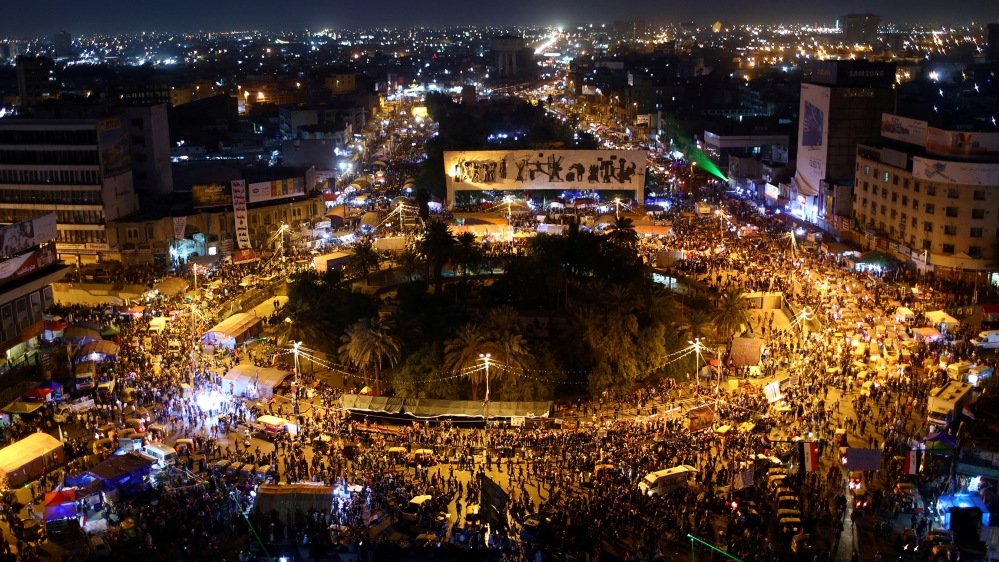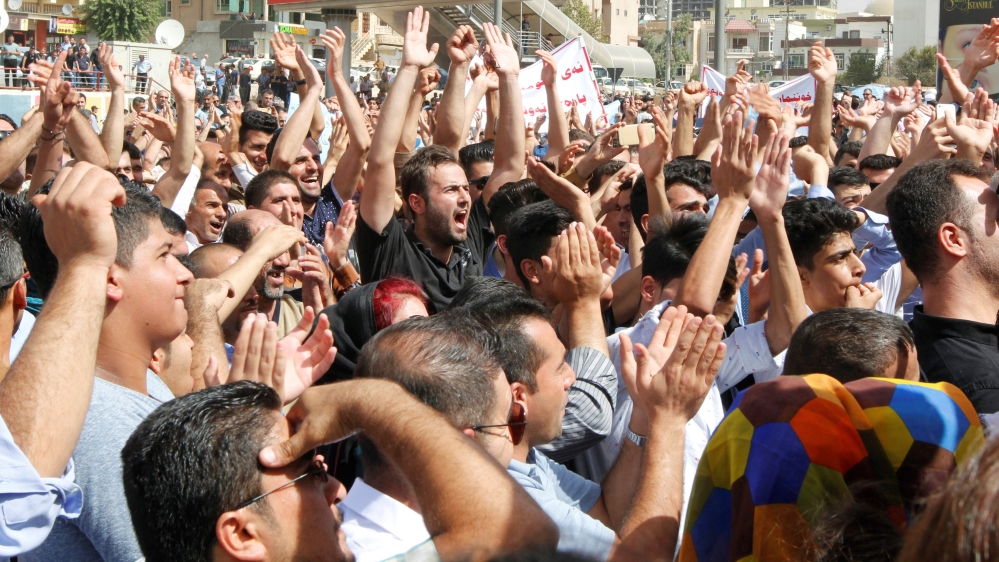Why are Iraqi Kurds not taking part in protests?
Anti-government demonstrations have gripped much of Iraq, but streets in Kurdish region have been calm.
![Erbil , Kurdistan [Mariya Petkova/Al Jazeera]](/wp-content/uploads/2019/11/78e116dfc52b4fcbb95198cd34b29880_18.jpeg?resize=770%2C513&quality=80)
Erbil, Iraq – When in early October Joseph Salio received a phone call from a group of Arab students based in the semi-autonomous Kurdish region of Iraq asking him to help organise a demonstration in solidarity with the protests in Baghdad and Basra, he did not hesitate to say yes. The 56-year-old member of the Communist Party of Kurdistan saw what was happening in the south as legitimate, rightful and timely.
But, shortly after he set up an event on Facebook and invited friends and media outlets, he says he received a phone call from the Kurdish intelligence regarding the planned demonstration. The same day his coorganisers tried but failed to obtain official written permission from the authorities.
Keep reading
list of 4 itemsTurkey hits 71 targets in Iraq, Syria in retaliation for soldiers’ deaths
Turkey says bombers came from Syria, threatens more cross-border strikes
‘Iraqis love life’: In conversation with Ala Talabani
Perceiving that the Kurdish Regional Government (KRG) was not supportive of the event, Salio decided to cancel. When asked about this case, the KRG spokesman Jutyar Adil said he had no information about it.

Since last month, hundreds of thousands of Iraqis have taken to the streets in the capital Baghdad and across southern towns and cities to protest against the government’s failure to deliver basic services and economic opportunities. In recent weeks, the demonstrators’ demands have broadened to include the resignation of the government and an overhaul of the political system introduced after the US-led invasion of 2003. More than 300 people have been killed since the uprising began.
In the semi-autonomous Kurdish region of northern Iraq, however, the streets have remained calm. Salio believes that authorities there did not grant permission for a demonstration because they were afraid of what such a protest could turn into.
In Erbil, there appears to be some solidarity with the Iraqis protesting in the south. Of about a dozen locals of different ages and economic backgrounds Al Jazeera spoke to, all of them said that they believed Iraqis have good reason to be on the streets.
Some said that in the Kurdish region, they face similar problems to those that have driven the protests in the south, including corruption and a lack of job prospects for young people. Youth unemployment is officially over 20 percent in the region and 25 percent nationwide.
However, people did not seem to be in the mood for protesting; some appeared jaded, while others said they were apprehensive of the possibility of political changes that could undermine Kurdish autonomy.
“Of course we have similar problems. And people have done protests [in the past] as well here, but nothing has come out of it,” says 19-year-old Hawjin, a history student at Salahaddin University in Erbil, who did not give her last name. “It has been useless. Sometimes protesters get attacked.”
Twenty-year-old Imad Shwan, also a student at Salahaddin University, agreed. “There are things to demand [from the regional government], to protest for, but people are afraid.”
2015-2018 unrest
In recent years, the Kurdish region has also witnessed mass protests against the regional government, demanding immediate action on corruption, better economic opportunities, better governance and basic services. In 2018, protests over the partial payment of wages erupted in Erbil and several other cities in the western part of the region.

The police cracked down on the protesters, injuring many and arresting over 80 people, including journalists. A few months earlier, in late 2017, people took to the streets in Sulaymaniyah, the second-biggest city in the region, over similar grievances; there, at least five people were killed and over 200 injured.
At that time, the KRG was struggling to pay public servants, after the central government in 2014 cut payments from the central budget to the region after a dispute over oil revenues and Erbil’s right to sell oil independently of the Iraqi state-owned energy company SOMO.
In response, the regional government cut the salaries of state employees, who make up some 50 percent of the working population of the region. This, along with growing public anger over the concentration of power and resources within the two most prominent Kurdish families – the Barzanis and the Talabanis – and the two parties associated with them – the Kurdistan Democratic Party (KDP) and the Patriotic Union of Kurdistan (PUK), sparked mass protests between 2015 and 2018.
In late 2018, however, a new Iraqi central government was formed under Prime Minister Adel Abdul Mahdi, who showed a willingness to resolve the dispute with Erbil. In March, Baghdad finally sent part of the budget allocation for the Kurdish region and public servants were able to receive their salaries in full for the first time since 2014.
This was cause for cautious optimism that a deal on oil revenues could be reached between the central government and the KRG, which lessened tensions in the streets. Most of the people Al Jazeera spoke to said that the situation in the Kurdish region has improved over the past few months, pointing out that it is not as bad as the south, specifically in terms of security and basic infrastructure.
So far, the KRG has supported Prime Minister Abdul Mahdi and his reform plan, despite ongoing calls from protesters for his resignation. While the regional authorities have also acknowledged the demands of the protesters and said they are legitimate, proposals for changing the constitution made by some politicians in Baghdad have caused unease in Erbil.
A parliamentary committee has been formed to work on draft amendments to the constitution and some existing articles which grant certain rights to the KRG have been raised.
“The problem is not the Iraqi constitution, but its application,” KRG President Nechirvan Barzani said at a November 5 news conference. “And even if the constitution needed to be amended, then that would have to happen in a secure environment.”
Fears of reduced autonomy
The KRG is concerned that the protesters’ calls for de-sectarianisation of Iraqi politics could be used by Baghdad as an excuse to change the constitution and curb regional rights. The 2014 dispute with the central government and the fallout of the 2017 independence referendum have made Erbil anxious that persisting animosity towards the Kurds among certain Arab political forces, along with pressure from Iran and Turkey, could threaten its autonomy. Such fears have spread among the general population in the Kurdish region as well and has affected the way many Iraqi Kurds see the protest wave in the south.

Some people shared concerns that all the gains the KRG has made since the 2003 US invasion of Iraq, including economic development and security – unmatched in the rest of the country – as well as cultural rights for the Kurdish population, could easily be lost.
“Someone sitting in Baghdad rewriting the constitution would never give Kurds their rights,” says 40-year old Bajdar, a day labourer, who did not give his last name. While he believes people in Baghdad and elsewhere have much reason to protest, he fears the demonstrations would not bring anything good to the Kurdish people.
He says the local economy has already been affected, with the threat of instability causing people to spend less.
“A friend of mine has a real estate office. Since the troubles began, he has been able to sign not even two contracts,” says Bajdar.
According to Shwan Seiyd Ali, a member of Gorran Movement, which is part of the current Kurdish government, the feeling that the region’s autonomy is under threat is the main reason why Iraq’s Kurdish people have not joined the protest wave in the south.
He said that the emerging narrative that constitutional changes are needed is a sign that various political forces in Baghdad aim to derail the protests and use them to achieve political goals.
“If politicians like Maliki, [former Prime Minister Haider] al-Abadi, and [Shia leader Moqtada] Sadr take control of the protests, then this would have a very negative impact on the future of Iraq,” he says.
This, however, is not a reason not to support the protests, Ali believes. It is also not a reason for the KRG to neglect its own internal problems and public discontent.
“If the situation in the KRI [the Kurdish region] remains the same, and if [the political elite] don’t take any serious action on corruption and justice, protests will erupt again in the region, and this time they will be much bigger than ever before,” he said.
Follow Mariya Petkova on Twitter: @mkpetkova.